its paid sponsors, whose products you need!
| Home |
| Intro |
| Current Issue |
|
Mailing List |
| Store |
| Strength |
| Subscriber Content |
| ARCHIVES
|
| Martialism |
| Pacifism |
| Q & A |
| Cunning-Hammery |
| Advertise With Us |
| Submit An Article |
| Staff |
| Discussion Forum |
| Links |
“Stay ‘unreasonable.’ If you
don’t like the solutions [available to you], come up with your
own.”
Dan Webre
The Martialist does not
constitute legal advice. It is for ENTERTAINMENT
PURPOSES ONLY.
Copyright © Phil Elmore, all rights
reserved.

By Phil Elmore
As I type this,
hurricane Katrina has wrought incredible devastation in portions of
the United States both geographically and economically. The most
widespread economic impact of this “act of God” is, as of this writing,
skyrocketing gasoline prices. Consumers are reporting price changes
of half a dollar or more in the same day. Talk radio hosts
are falling over themselves to discuss the effects on the economy, on
shipping and commerce, and on individual drivers. Hard-luck stories
from across the country are mingling with tales of true tragedy from the
areas hardest hit by the hurricane itself. Some are calling for
price freezes amidst charges of gouging by the oil companies. Dire
predictions are being made for and by commuters, those fearful of
recession, and American citizens across this land.
Basically, everybody’s freaking out.
It’s bad “down there,” too, with reports of looting, violence, near- or
full-blown riots, bands of armed citizens roaming and stealing… We’re
seeing the illusory foundations of our supposedly civil society crumble
overnight. We’re learning that the veneer of authority that holds us
in check is more shadow than substance. In the absence of the threat
of immediate reprisal, human beings revert to their most venal state.
They are willing to prey on others to get what they want. The only
thing that stands between them and you is… well, you. Only
your ability to prepare for emergencies will help you in the absence of
civil order and in emergency conditions.
The Martialist contains extensive articles on preparing for
emergencies. It goes without saying that if you can stockpile the
types of things that will get you through an emergency, you should.
If you’re reading this, chances are that you’re not in the center of a
disaster area. Nonetheless, you must consider what you should do in
such emergencies and act accordingly before the fact. Buy
guns, fuel, ammunition, and batteries now not after you discover
they’re in short supply.
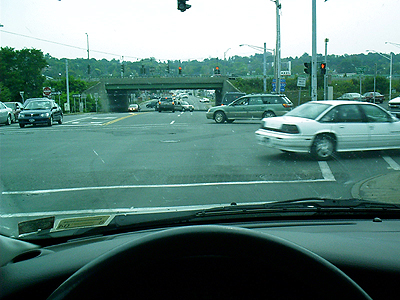
Your fellow citizens could easily become
a threat to your safety
in an emergency or condition of civil unrest. Don’t trust them.
The overwhelming majority of us, however, will not endure civil unrest
directly. No, what most of us will face will be the work-a-day
economic impact of this disaster. Specifically, we’ll be freaking
out because the price of gasoline is much higher than it used to be.
If you’re like most productive members of society, you don’t have much of
a choice when it comes to using gasoline. You’ve got to get to work
and go about your life just like the rest of us. You probably can’t
trade in your car for a bicycle or a scooter. You probably can’t
simply stop traveling. There are many things you can do, though,
both to reduce your fuel consumption and increase your personal safety.
Buy a Locking Gas Cap
Whenever the price of a commodity increases, the willingness of people to
steal it also increases. Every time gas prices rise, gas stations
report an increase in drive-aways people who pull up, fill up, and then
drive off without paying. As prices for gas go even higher, we’re
going to see another problem: siphoning. Think about it:
most people’s gas tanks are completely accessible to anyone who wants to
unscrew the cap. When gas prices skyrocket, the fuel in your tank
becomes liquid gold to thieves and desperate drivers. It’s a few
steps removed from the chicken-wire covered dune buggies of Mad Max,
but the threat is real nonetheless. Someone very likely could steal
the gasoline right out of your automobile.

An auto parts store can sell you a
suitable locking gas cap.
Go to your local auto parts store and buy a locking gas cap for your car
or truck. The cap is specific to the make and model of your ride.
You can’t simply buy any aftermarket cap, so make sure you go to a store
whose staff can determine correctly what you need. Put the cap key
on the same key ring on which you keep your ignition key. That way
you can’t lose it. (Well, you could lose it, but then you
wouldn’t be able to drive your car.)
Granted, the cheesy locks on these caps aren’t going to stop a determined
thief. They will, however, keep out the majority of gas-stealing
fellow drivers who are looking for a target of opportunity. Think of
most of your fellow drivers as potential shoplifters. They’re not
professionals, but they’ll take free gas if they think they can get away
with it.
Check Those Tires
Improper tire pressure is unsafe for many reasons. It can cause
uneven tire wear, increase the chance of a blow-out while driving, and
degrade handling. It also hinders fuel economy. Your car moves
best when the tires are in good condition and properly inflated.
Check your tire pressure regularly and make sure the tires are maintained
at the manufacturer’s specifications.
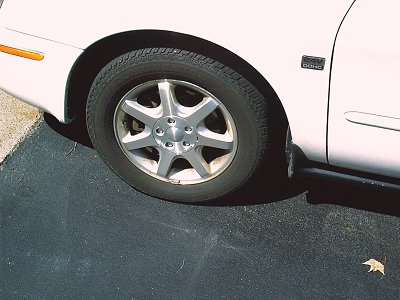
Make sure your tire pressure is maintained at specifications.
Many oil change places offer these checks for free. At my local
Valvoline Instant Oil Change, for example, I can have my tire pressure
checked and my engine and wiper fluids topped off for no charge.
Change That Oil (and Check Those Filters)
Changing the oil in your car every 3,000 to 4,000 miles is simply
good sense. Regular oil changes help your car to last longer.
If you go to a full-service oil change place that also checks your other
fluids, they can keep your power steering fluid, brake fluid, and coolant
levels checked and full. An engine that runs more smoothly uses less
fuel.
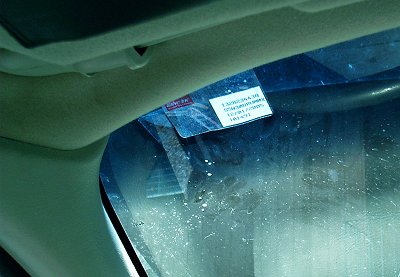
Is your car overdue for an oil change and fluid/filter check?
Don’t fall for the scam used by many places where your air filters are
concerned. Oil change attendants love to show you a cabin or engine
air filter that has some dirt on it, counting on your disgust to make you
want the filter changed out. The cabin air filter actually works
better when it’s a little dirty, rather than brand new. If the
filter is absolutely filthy, go ahead and have them change it out.
Make sure your fuel filter is checked regularly and replace it when in
doubt. That fuel filter directly impacts your performance. My
father dispensed plenty of advice to me about vehicle maintenance when I
was a kid (I still remember him showing me how to replace a radiator hose
when it burst, or a headlight when it burned out). When I went away
to college he insisted that I make sure my car’s fuel filter was checked
when I had my old Chevy Caprice serviced.
Stock Your Vehicle
Your car is a great place to carry a variety of gear. Driving a car at
all demands that you be prepared for certain problems, ranging from
inclement weather to mechanical difficulty to civil unrest. Your car
may also be the vehicle in which you evacuate the area in the case of a
natural disaster or some other kind of widespread problem. It is to
your advantage to have your vehicle as well-stocked as possible.
Everything
you could ever want can be carried in a trunk in an inexpensive,
waterproof ammo can from your local military surplus store. I suggest you
strap it down with paracord so it won’t shift while you’re driving.
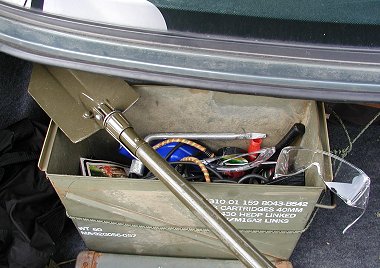
Stock the trunk of your car with survival gear.
Your trunk supplies should include a shovel for digging out of snow and
mud. The folding military entrenching tool is a great option. It takes up
little space, it’s very tough, and it can be wielded like an axe for use
as an expedient self-defense weapon. You should also have simple hand
tools pliers, screwdrivers, and adjustable wrenches, for example as
well as jumper cables and possibly a gasoline siphon and funnel. A crowbar
is a good lever for when you’re stuck and it, too, can be used for
self-defense. It doesn’t hurt to have safety glasses, either (an idea I
picked up from Massad Ayoob). My work as a technical writer sometimes
takes me into factories and other industrial environments where eye
protection is required, which is why I carry them, but working in and
around an automobile is a potentially hazardous activity for which eye
protection is useful.
If you live in an area where you could be stranded in cold weather, make
sure you have boots, gloves, and a heavy coat in the trunk (in case you get
caught without them). A scarf can do double duty as a hat and ear protection.
If you need glasses or contacts in order to see to drive, make sure you carry
a backup pair of spectacles in your car in case you break or lose your lenses
while you’re far from home. I know I’d prefer not to try and squint my way
through highway traffic.
Paracord is one of those supplies that seems to have a million and one
uses. You can buy loops of this stuff from discount stores in the camping
section. Mil-spec cord is available online from numerous suppliers. Keep a
small pair of scissors with the paracord, as well as a lighter (or even a book
of matches) for heating and sealing the ragged ends.
Food and water is one of those things that should be tucked away inside
your vehicle. Just before the Y2K Scare proved bogus, companies online were
selling these neat little cardboard survival kits that included
juice-box-sized containers of water, energy bars, light sticks, and other
survival goodies, presumably because your family would be huddled together in
the post-apocalypse with nothing else to eat or drink. One of these kits can
easily fit in a corner of your trunk in case you’re stuck in a blizzard or
lost by the side of a dirt road somewhere.
Don’t forget to stock your glove compartment with maps, your car’s manual, and
whatever else you use frequently. Leftover space should be devoted to small
survival items, like the prepackaged survival tins you can buy online or from
catalogs. Each little tin is different (and you can even make your own, such
as the AOL Survival Tin).
The one in my glove box has things like fish hooks, a pencil and paper, a tiny
pocket knife, a small candle, and numerous other thoughtful odds and ends.
Keep handy a sealed travel packet of painkillers, like Asprin or Tylenol.
Anti-bacterial towelettes are another useful clean-up item when you’re on the
road. Add a commercially purchased portable first-aid kit to round out your
emergency items.
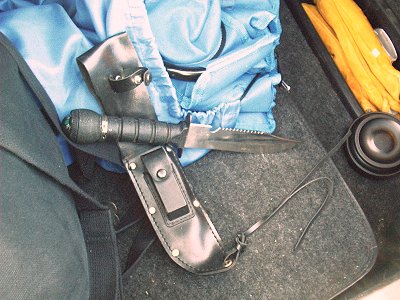
A good survival knife is also useful, but know your local laws.
Knives are always useful items and you should carry one if you can.
However, when stocking your car, be aware of your local laws. In some
states it’s illegal to carry a knife of significant size in your
automobile. In other municipalities, it may not be against the law, but it
might make your friendly traffic cop nervous and prompt him to give you
trouble. Consider what you’ll have to explain if your vehicle is searched
for whatever reason.
Arm Yourself and Be Alert
A friend of mine who is an over-the-road truck driver told me that as soon
as fuel prices started to climb, he and his fellow drivers became more
wary. They started guarding their trucks more closely and watching
out for everything from fuel thieves to hijackers. When you wake up
and find yourself living in “interesting times,” it’s a good idea to arm
yourself and stay alert.
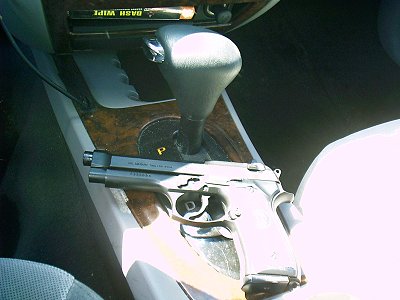
A weapon is your last, best means of defending your vehicle (and you).
It goes without saying that any weaponry you carry should be legal.
You should also be trained to use it. Don’t strap a machete next to
your booby-trap gas tank explosives on the underside of your converted
Mad Max MFP interceptor if you don’t have the faintest idea how to use
either.

An armed citizen is the bane of carjackers and looters.
Keep It In Perspective
Do you remember the gas crisis of the 1970s? Does the word “OPEC”
ring a bell? If so, you also remember that the whole thing was much
ado about nothing. The fastest way to create a shortage of a good or
service is to tell people there’s going to be a shortage.
People start changing their behavior out of fear, hording things they
don’t really need in an attempt to prepare for the coming shortage and
what they manage to do is create that shortage in the first place,
making it a self-fulfilling prophecy.
I remember reading a retrospective in a car magazine that covered that
period. At the time, the editors of the magazine took a small car
say, a Chevy Vega or something like that slapped on every aerodynamic
piece of aftermarket garbage they could find, and improved fuel economy by
a whopping 3% or so. “Were we scared?” they commented in the
retrospective. “Yeah, we were scared.”
The fact is, though, that human beings are remarkably resilient and
adaptive when they have to be. Our economy will survive and our
lifestyle will go on. We will change what we drive, or how, if we
must but we’ll be fine and this latest “crisis” will pass if it is not
preemptively solved.
Remember that and take appropriate actions.
